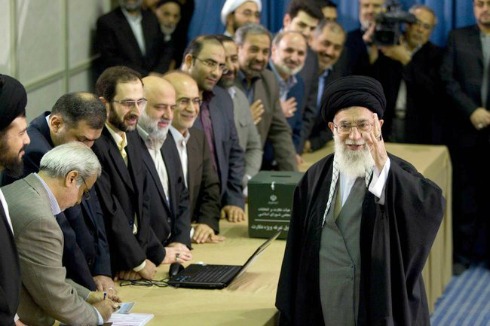Archives
AND MORE...

Stuck on Arrogant
_____________________

From The Mouths Of Historians
_____________________

Bunkum, Balderdash & Murder
_____________________

Triple "D" (Squared!)
_____________________

We Lied
_____________________
October 20, 2012
Death, Deceit & Dishonor
The paper of record for the Obama administration, i.e., the New York Times reports the US and Iran “have agreed in principle for the first time to one-on-one negotiations over Iran’s nuclear program."
Of course a few paragraphs down, comes the line, the "White House publicly denied the report on Saturday evening” (which has since been replaced by "The White House denied that a final agreement had been reached").
A trial balloon put out by the Obama administration? Maybe, but let’s assume for a nanosecond it’s true. What exactly would Mr. Obama negotiate away in these negotiations? And when has the Obama administration ever engaged in successful negotiations, i.e., successful as in beneficial to the US?
An American ambassador and three other patriotic Americans were murdered in cold blood last month in Libya, and the American embassy/consulate was destroyed. Six weeks later our Commander-in-Chief has yet to make a coherent (and truthful) statement to the American people about what really happened.
Meanwhile, a cable news channel (i.e., Fox News) sent investigative reporters to the site of the murders in Libya; collected enough information to produce a detailed documentary about the chain of events leading up to and during the night of Sept 11th; and aired the documentary (“Death and Deceit in Benghazi”) on Friday. But the Obama administration is still investigating, and will no doubt continue investigating... at least until after the upcoming elections.
We cannot remember an American administration that has so politicized our national security/foreign policy. So is this the administration Americans want negotiating with an apocalyptical regime over their nuclear weapons program?!
The only thing that could possibly top that is an announcement that Jimmy Carter will lead the negotiations…
The New York Times | October 20, 2012
U.S. Officials Say Iran Has Agreed to Nuclear Talks
By Helene Cooper and Mark Landler

Ayatollah Ali Khamenei, Iran's supreme leader, has the last word on whether talks should occur. Caren Firouz/Reuters
WASHINGTON — The United States and Iran have agreed in principle for the first time to one-on-one negotiations over Iran's nuclear program, according to Obama administration officials, setting the stage for what could be a last-ditch diplomatic effort to avert a military strike on Iran.
Iranian officials have insisted that the talks wait until after the presidential election, a senior administration official said, telling their American counterparts that they want to know with whom they would be negotiating.
News of the agreement — a result of intense, secret exchanges between American and Iranian officials that date almost to the beginning of President Obama's term — comes at a critical moment in the presidential contest, just two weeks before Election Day and the weekend before the final debate, which is to focus on national security and foreign policy.
It has the potential to help Mr. Obama make the case that he is nearing a diplomatic breakthrough in the decade-long effort by the world's major powers to curb Tehran's nuclear ambitions, but it could pose a risk if Iran is seen as using the prospect of the direct talks to buy time.
It is also far from clear that Mr. Obama's opponent, Mitt Romney, would go through with the negotiation should he win election. Mr. Romney has repeatedly criticized the president as showing weakness on Iran and failing to stand firmly with Israel against the Iranian nuclear threat.
The White House denied that a final agreement had been reached. "It's not true that the United States and Iran have agreed to one-on-one talks or any meeting after the American elections," Tommy Vietor, a White House spokesman, said Saturday evening. He added, however, that the administration was open to such talks, and has "said from the outset that we would be prepared to meet bilaterally."
Reports of the agreement have circulated among a small group of diplomats involved with Iran.
There is still a chance the initiative could fall through, even if Mr. Obama is re-elected. Iran has a history of using the promise of diplomacy to ease international pressure on it. In this case, American officials said they were uncertain whether Iran's supreme leader, Ayatollah Ali Khamenei, had signed off on the effort. The American understandings have been reached with senior Iranian officials who report to him, an administration official said.
Even if the two sides sit down, American officials worry that Iran could prolong the negotiations to try to forestall military action and enable it to complete critical elements of its nuclear program, particularly at... more here.
Log In »
Notable Quotables
"Mr. Netanyahu is one of the most media-savvy politicians on the planet. On Friday he appeared live via video link on 'Real Time with Bill Maher,' taking the host’s alternately sardonic and serious line of questioning with gazelle-like alacrity."
~ Anthony Grant, jourrnalist who has written for many major newspapers and worked in television at Paris and Tel Aviv, interviewing former PM Benjamin Netanyahu on Monday, at the outset of Mr. Netanyahu's new book (more here).
And Then Some
Dangling Israel
March 24, 2022
New Global Leaders
March 23, 2022
Ukraine Can Learn From Israel
January 31, 2022



